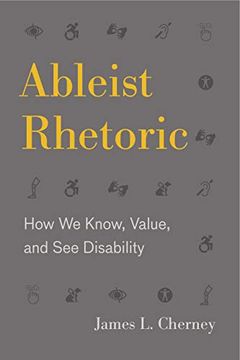Share
Ableist Rhetoric: How we Know, Value, and see Disability: 11 (Rsa Series in Transdisciplinary Rhetoric)
James L. Cherney (Author)
·
Pennsylvania State University Press
· Paperback
Ableist Rhetoric: How we Know, Value, and see Disability: 11 (Rsa Series in Transdisciplinary Rhetoric) - James L. Cherney
£ 26.06
£ 28.95
You save: £ 2.90
Choose the list to add your product or create one New List
✓ Product added successfully to the Wishlist.
Go to My WishlistsIt will be shipped from our warehouse between
Tuesday, June 04 and
Wednesday, June 05.
You will receive it anywhere in United Kingdom between 1 and 3 business days after shipment.
Synopsis "Ableist Rhetoric: How we Know, Value, and see Disability: 11 (Rsa Series in Transdisciplinary Rhetoric)"
Ableism, a form of discrimination that elevates "able" bodies over those perceived as less capable, remains one of the most widespread areas of systematic and explicit discrimination in Western culture. Yet in contrast to the substantial body of scholarly work on racism, sexism, classism, and heterosexism, ableism remains undertheorized and underexposed. In this book, James L. Cherney takes a rhetorical approach to the study of ableism to reveal how it has worked its way into our everyday understanding of disability. Ableist Rhetoric argues that ableism is learned and transmitted through the ways we speak about those with disabilities. Through a series of textual case studies, Cherney identifies three rhetorical norms that help illustrate the widespread influence of ableist ideas in society. He explores the notion that "deviance is evil" by analyzing the possession narratives of Cotton Mather and the modern horror touchstone The Exorcist. He then considers whether "normal is natural" in Aristotle's Generation of Animals and in the cultural debate over cochlear implants. Finally, he shows how the norm "body is able" operates in Alexander Graham Bell's writings on eugenics and in the legal cases brought by disabled athletes Casey Martin and Oscar Pistorius. These three simple equivalencies play complex roles within the social institutions of religion, medicine, law, and sport. Cherney concludes by calling for a rhetorical model of disability, which, he argues, will provide a shift in orientation to challenge ableism's epistemic, ideological, and visual components. Accessible and compelling, this groundbreaking book will appeal to scholars of rhetoric and of disability studies as well as to disability rights advocates.

